Informationen zum Anschluss der Tastatur:
https://mikrosk.github.io/doitarchive/doit_st/0f01.htm
Umgesetzt mit einen Arduino Pro Micro und dieser Software:
https://github.com/devonshire/arduino-atari-hid-keyboard
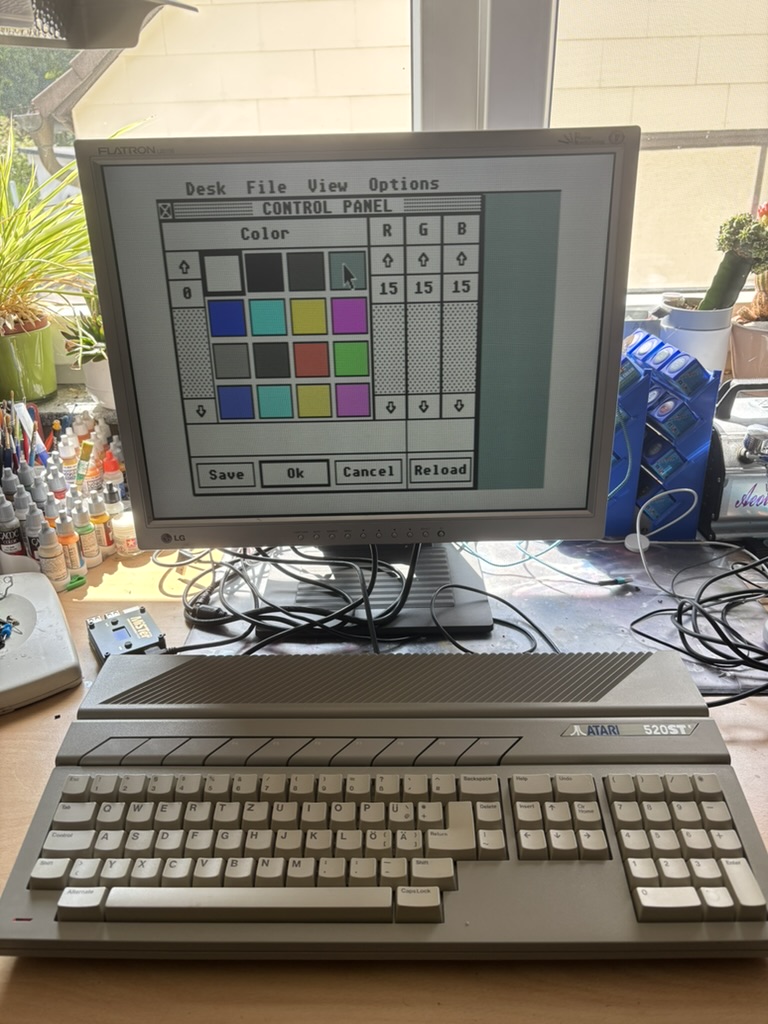
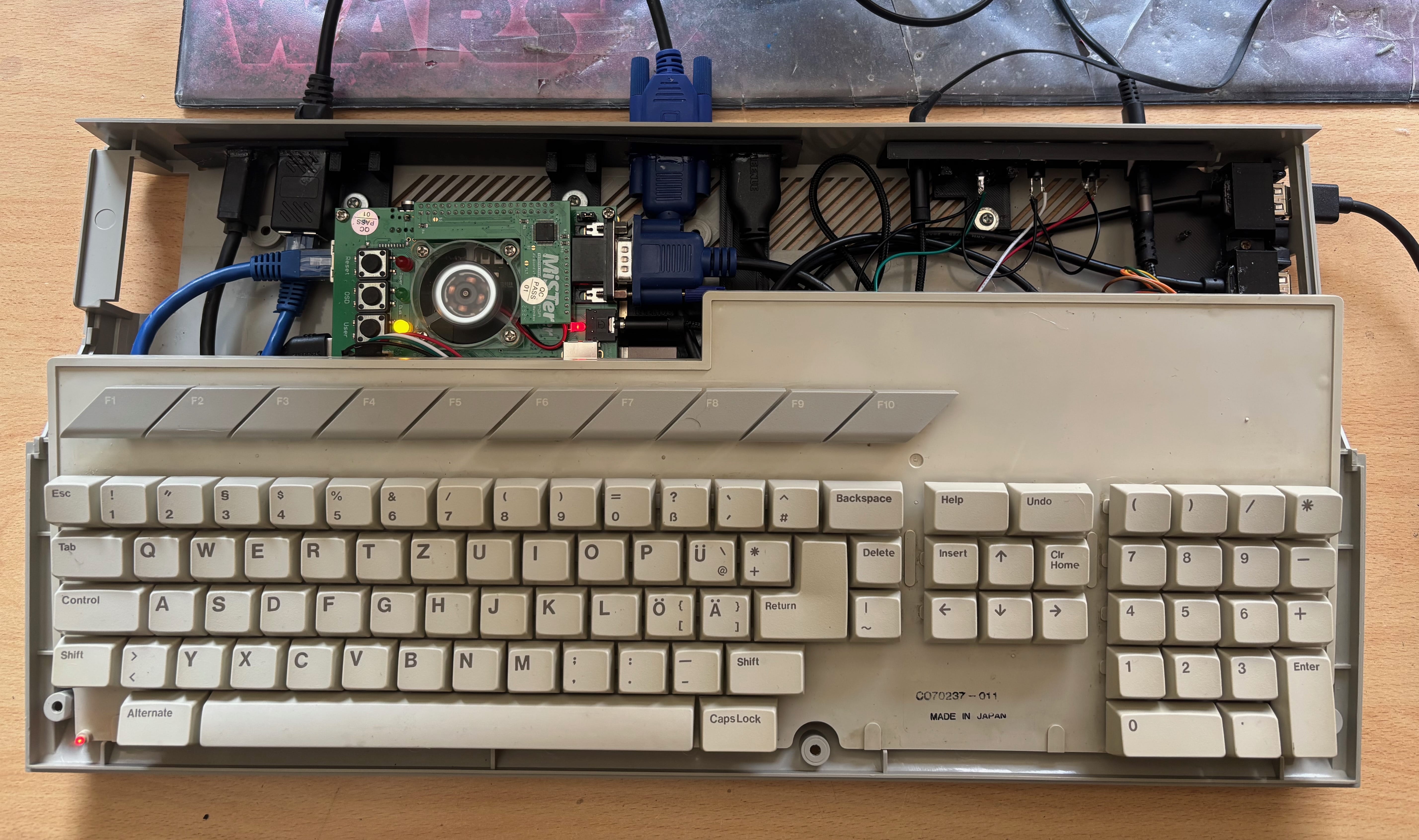
Natürlich verfügt der ST auch wieder über ein Zaparoo-Laufwerk, um stilecht Spiele starten zu können:
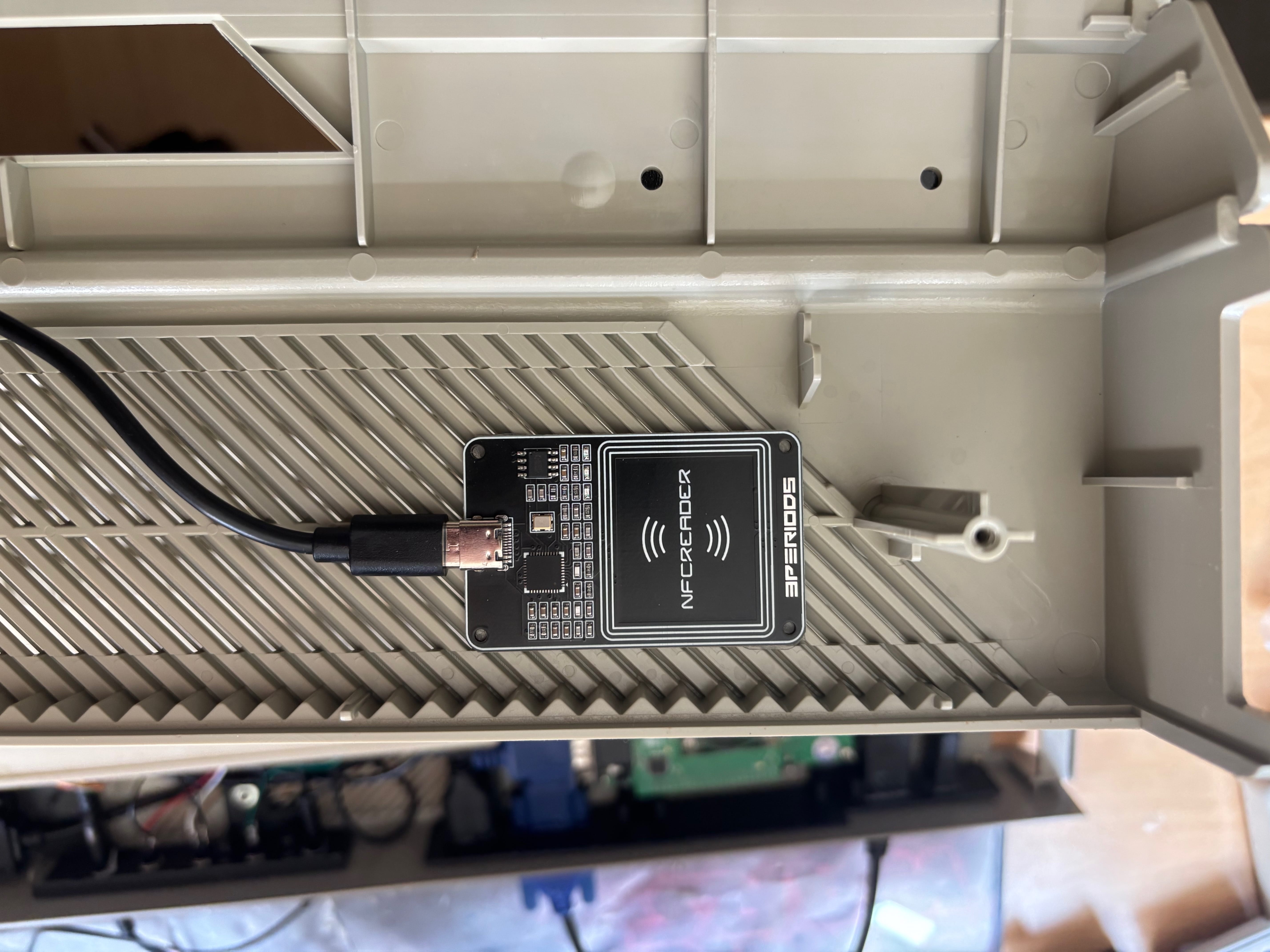
Die Öffnungen auf der Rückseite sind okay, meine STLs sind recht rudimentär, funktieren aber gut:
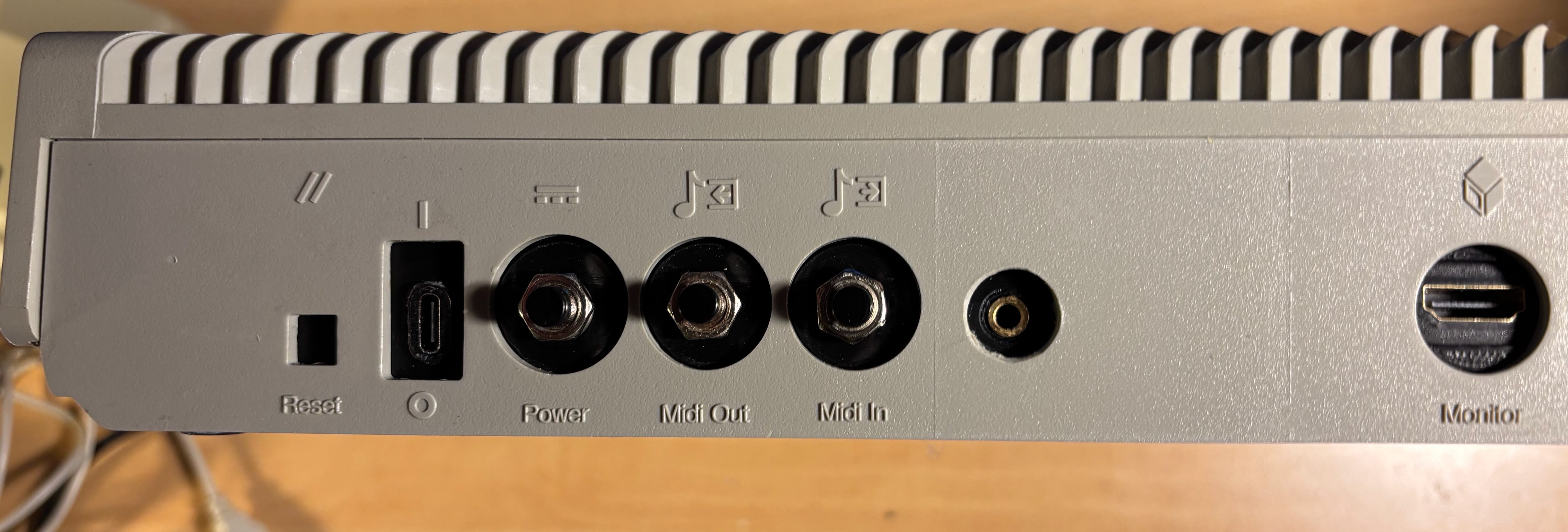

Den SNAC-Port habe ich an der Seite ausgeführt, ich benötige ihn eigentlich nur für meine Soundkarte auf Basis des MT-32 Pi:
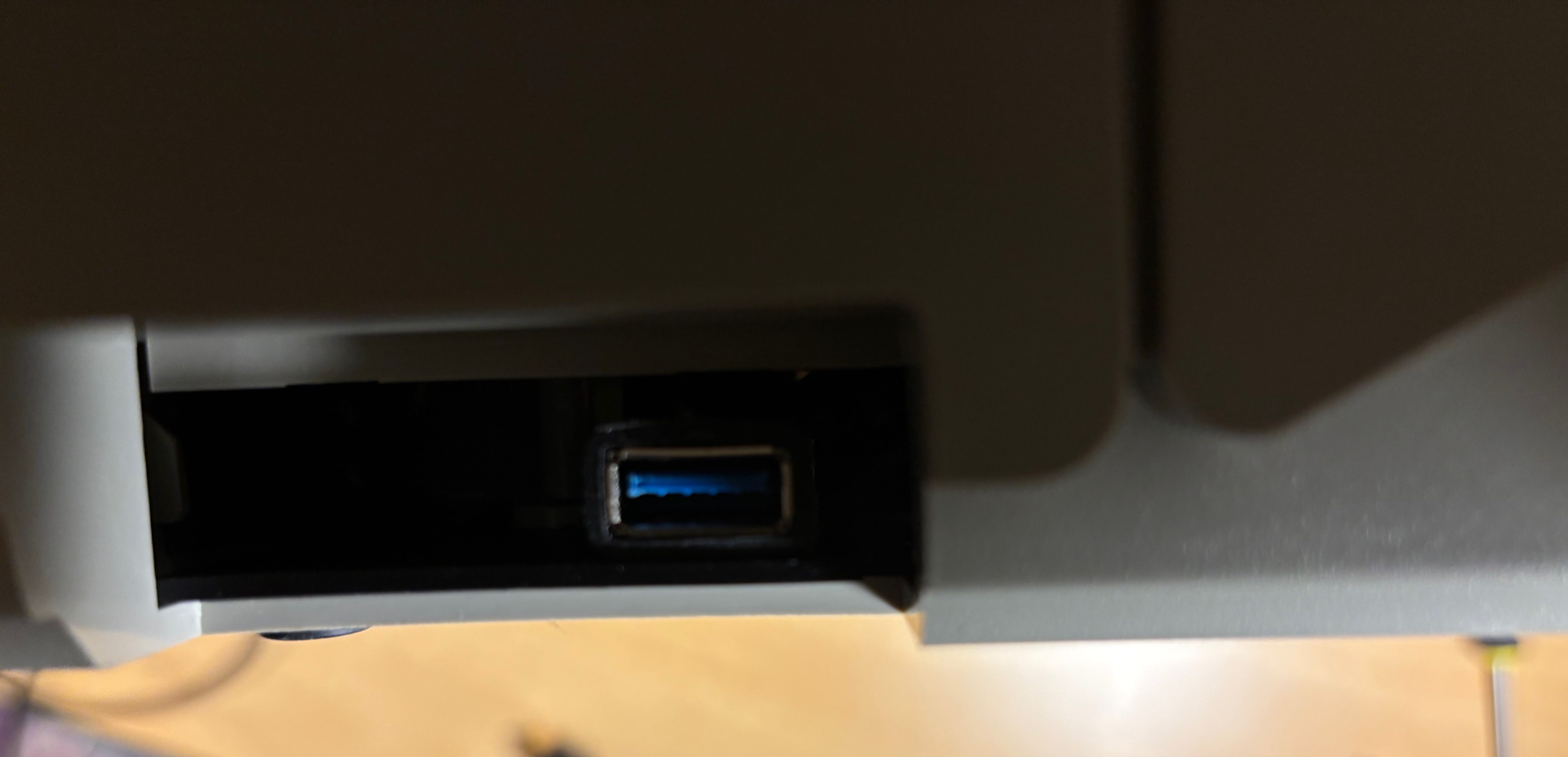
Die STLs sind hier:
Transclude of atari_st_inserts.zip
Key Codes für das Keyboard sind hier:
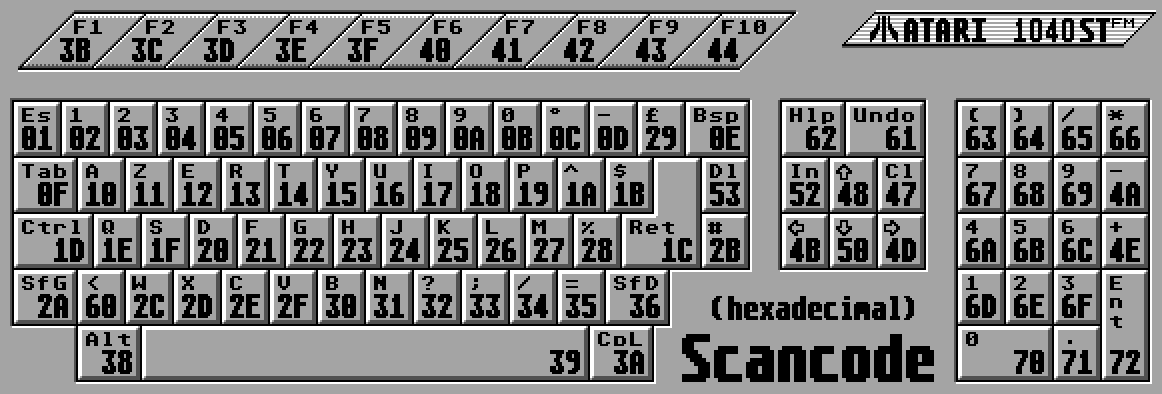
Quelle: Clavier, code ASCII et remplissage graphique de l’Atari ST
Der Code für das Keyboard musste für den MISTer angepasst werden:
https://github.com/sascha-schieferdecker/arduino-atari-hid-keyboard/
#include <Keyboard.h>
/*
* -------------------------------------------------------------------------
* Interface Atari ST Keyboard to USB HID Keyboard
* -------------------------------------------------------------------------
* Initial idea and some original code provided by user 'joska' of
* http://www.atari-forum.com - license unknown
* -------------------------------------------------------------------------
* Copyright Kevin Peat 2017
* kevin@kevinpeat.com
* My changes and additions are licensed public domain
* -------------------------------------------------------------------------
* Developed for use with an Arduino Leonardo as it is able to act directly
* as a USB keyboard controller so doesn't require the Arduino firmware to
* be modified as some of the other Arduinos (eg. Uno) would do
* -------------------------------------------------------------------------
*/
//#define DEBUG
// ST keyboard reset pin
const int ST_KB_RESET = 4;
// Atari modifier key codes
const uint8_t ST_LEFT_CTRL = 0x1D;
const uint8_t ST_LEFT_SHIFT = 0x2A;
const uint8_t ST_LEFT_ALT = 0x38;
const uint8_t ST_RIGHT_SHIFT = 0x36;
const uint8_t ST_CAPS_LOCK = 0x3A;
// Arduino Leonardo modifier key codes
const uint8_t ARD_LEFT_CTRL = 0x80;
const uint8_t ARD_LEFT_SHIFT = 0x81;
const uint8_t ARD_LEFT_ALT = 0x82;
const uint8_t ARD_RIGHT_SHIFT = 0x85;
const uint8_t ARD_CAPS_LOCK = 0xC1;
// Arduino Leonardo special key codes
const uint8_t ARD_UP_ARROW = 0xDA;
const uint8_t ARD_DOWN_ARROW = 0xD9;
const uint8_t ARD_LEFT_ARROW = 0xD8;
const uint8_t ARD_RIGHT_ARROW = 0xD7;
const uint8_t ARD_BACKSPACE = 0xB2;
const uint8_t ARD_TAB = 0xB3;
const uint8_t ARD_RETURN = 0xB0;
const uint8_t ARD_ESC = 0xB1;
const uint8_t ARD_INSERT = 0xD1;
const uint8_t ARD_DELETE = 0xD4;
const uint8_t ARD_HOME = 0xD2;
const uint8_t ARD_F1 = 0xC2;
const uint8_t ARD_F2 = 0xC3;
const uint8_t ARD_F3 = 0xC4;
const uint8_t ARD_F4 = 0xC5;
const uint8_t ARD_F5 = 0xC6;
const uint8_t ARD_F6 = 0xC7;
const uint8_t ARD_F7 = 0xC8;
const uint8_t ARD_F8 = 0xC9;
const uint8_t ARD_F9 = 0xCA;
const uint8_t ARD_F10 = 0xCB;
const uint8_t ARD_F11 = 0xCC;
const uint8_t ARD_F12 = 0xCD;
const uint8_t ARD_KEYPAD_DIVIDE = 0xDC;
const uint8_t ARD_KEYPAD_MULTIPLY = 0xDD;
// Keyboard auto-repeat
static uint8_t last_make; // Last make char
static unsigned long last_make_time; // Last make time (milliseconds)
int auto_repeat_delay = 500; // Keyboard auto-repeat delay (milliseconds)
int auto_repeat_rate = 25; // Keyboard auto-repeat rate (milliseconds)
// Key scancodes
// Use ST scancode as index to find the corresponding USB scancode.
// Make-codes are single byte, with some exceptions.
// These are escaped with a 0xe0 byte, when this appear in this table a
// simple switch is used to look up the correct scancode.
// All break codes are the same as the scancodes, but are prefixed with 0xf0.
// The escaped keys are first escaped, then 0xf0, then scancode.
uint8_t scanCodes[] =
{
0x00, // (Nothing)
ARD_ESC, // Esc
0x31, // 1
0x32, // 2
0x33, // 3
0x34, // 4
0x35, // 5
0x36, // 6
0x37, // 7
0x38, // 8
0x39, // 9
0x30, // 0
0x2D, // -
0x3D, // == (Mapped to =)
ARD_BACKSPACE, // Backspace
ARD_TAB, // Tab
0x71, // q
0x77, // w
0x65, // e
0x72, // r
0x74, // t
0x79, // y
0x75, // u
0x69, // i
0x6F, // o
0x70, // p
0x5B, // [
0x5D, // ]
ARD_RETURN, // Enter
ARD_LEFT_CTRL, // Control
0x61, // a
0x73, // s
0x64, // d
0x66, // f
0x67, // g
0x68, // h
0x6A, // j
0x6B, // k
0x6C, // l
0x3B, // ;
0x27, // ' (Mapped to '")
0xE0, // #
ARD_LEFT_SHIFT, // Lshift
0x7E, // #~ (Mapped to ~)
0x7A, // z
0x78, // x
0x63, // c
0x76, // v
0x62, // b
0x6E, // n
0x6D, // m
0x2C, // ,
0x2E, // .
0x2F, // /
ARD_RIGHT_SHIFT, // Rshift
0x37, // (Not used)
ARD_LEFT_ALT, // Alternate
0x20, // Space
ARD_CAPS_LOCK, // CapsLock
ARD_F1, // F1
ARD_F2, // F2
ARD_F3, // F3
ARD_F4, // F4
ARD_F5, // F5
ARD_F6, // F6
ARD_F7, // F7
ARD_F8, // F8
ARD_F9, // F9
ARD_F10, // F10
0x45, // (Not used)
0x46, // (Not used)
0xE0, // Clr/Home
0xE0, // Up Arrow
0x49, // (Not used)
0x2D, // N-
0xE0, // Left Arrow
0x4c, // (Not used)
0xE0, // Right Arrow
0x2B, // N+
0x4f, // (Not used)
0xE0, // Down Arrow
0x51, // (Not used)
0xE0, // Insert
0xE0, // Delete
0x54, // (Not used)
0x55, // (Not used)
0x56, // (Not used)
0x57, // (Not used)
0x58, // (Not used)
0x59, // (Not used)
0x5a, // (Not used)
0x5b, // (Not used)
0x5c, // (Not used)
0x5d, // (Not used)
0x5e, // (Not used)
0x5f, // (Not used)
0x5C, // ISO Key
0xB2, // Undo (Mapped to Backspace)
ARD_F12, // Help (Mapped to F12 which is the Hatari menu key)
0x28, // N(
0x29, // N)
0xE0, // N/
0xE0, // N*
0x37, // N7
0x38, // N8
0x39, // N9
0x34, // N4
0x35, // N5
0x36, // N6
0x31, // N1
0x32, // N2
0x33, // N3
0x30, // N0
0x2E, // N.
0xE0 // NEnter
};
// Forward declarations for functions used before they are defined
void send_key_event(uint8_t code, bool is_press);
boolean process_modifier(uint8_t key);
void setup(void)
{
// Initialize keyboard:
Keyboard.begin();
// Open serial port from Atari keyboard
Serial1.begin(7812);
#ifdef DEBUG
// Open serial port to PC
Serial.begin(9600);
#endif
// Reset ST keyboard
delay(200);
reset_st_keyboard();
delay(200);
// Empty serial buffer before starting
while(Serial1.available() > 0) Serial1.read();
}
void loop()
{
// Process incoming Atari keypresses
if (Serial1.available() > 0) process_keypress(Serial1.read());
// Handle keyboard auto-repeat
// auto_repeat(); // disabled: we now honor real make/break
}
// Reset ST Keyboard
void reset_st_keyboard(void)
{
Serial1.write((uint8_t)0x80);
Serial1.write((uint8_t)0x01);
pinMode(ST_KB_RESET, OUTPUT);
digitalWrite(ST_KB_RESET, HIGH);
delay(20);
digitalWrite(ST_KB_RESET, LOW);
delay(20);
digitalWrite(ST_KB_RESET, HIGH);
}
// Process each keypress
void process_keypress(uint8_t key)
{
// Valid ST range
if (((key & 0x7f) > 0) && ((key & 0x7f) < 0x73))
{
if (key & 0x80) // Break
{
last_make = 0;
last_make_time = 0;
// still forward to release non-modifier keys
convert_scancode(key);
}
else // Make
{
last_make = key;
last_make_time = millis();
convert_scancode(key);
}
}
}
void convert_scancode(uint8_t key)
{
uint8_t break_code = key & 0x80;
uint8_t st_sc = key & 0x7f;
uint8_t pc_code = scanCodes[st_sc];
bool is_break = break_code;
bool escaped = (pc_code == 0xe0);
#ifdef DEBUG
Serial.print("Atari scancode: ");
Serial.println(key, DEC);
Serial.print("PC scancode: ");
Serial.println(pc_code, DEC);
Serial.print("Break code: ");
Serial.println(break_code, DEC);
Serial.print("Escaped: ");
Serial.println(escaped, DEC);
#endif
// Handle modifier key presses (and CapsLock tap)
if (process_modifier(key)) return;
// Map escaped keys to Arduino HID keycodes, then send make/break
if (escaped)
{
switch (st_sc)
{
case 0x48: send_key_event(ARD_UP_ARROW, !is_break); break; // Up
case 0x4b: send_key_event(ARD_LEFT_ARROW, !is_break); break; // Left
case 0x4d: send_key_event(ARD_RIGHT_ARROW, !is_break); break; // Right
case 0x50: send_key_event(ARD_DOWN_ARROW, !is_break); break; // Down
case 0x52: send_key_event(ARD_INSERT, !is_break); break; // Insert
case 0x53: send_key_event(ARD_DELETE, !is_break); break; // Delete
case 0x47: send_key_event(ARD_HOME, !is_break); break; // Home
case 0x65: send_key_event(ARD_KEYPAD_DIVIDE, !is_break); break; // Numpad /
case 0x66: send_key_event(ARD_KEYPAD_MULTIPLY, !is_break); break; // Numpad *
case 0x72: send_key_event(ARD_RETURN, !is_break); break; // Numpad Enter
case 0x2b: send_key_event('#', !is_break); break; // Tilde/# mapping
case 0x62: send_key_event(ARD_F1, !is_break); break; // Help -> F1
default: break;
}
}
else
{
// Non-escaped keys: send make/break with the mapped code
send_key_event(pc_code, !is_break);
}
}
// Send code for escaped Atari keypresses
void send_escaped_key(uint8_t key)
{
Keyboard.press(key);
delay(20);
Keyboard.release(key);
}
// Press or release a key (ASCII for printable, ARD_* for specials)
void send_key_event(uint8_t code, bool is_press)
{
if (is_press) {
Keyboard.press(code);
} else {
Keyboard.release(code);
}
}
// Process modifier keypresses
boolean process_modifier(uint8_t key)
{
// Modifier key press
switch (key)
{
case ST_LEFT_CTRL:
Keyboard.press(ARD_LEFT_CTRL);
return true;
case ST_LEFT_SHIFT:
Keyboard.press(ARD_LEFT_SHIFT);
return true;
case ST_LEFT_ALT:
Keyboard.press(ARD_LEFT_ALT);
return true;
case ST_RIGHT_SHIFT:
Keyboard.press(ARD_RIGHT_SHIFT);
return true;
case ST_CAPS_LOCK:
// Treat as a tap (toggle), not a hold
Keyboard.press(ARD_CAPS_LOCK);
delay(20);
Keyboard.release(ARD_CAPS_LOCK);
return true;
}
// Modifier key release (no Caps Lock here)
switch (key & 0x7f)
{
case ST_LEFT_CTRL:
Keyboard.release(ARD_LEFT_CTRL);
return true;
case ST_LEFT_SHIFT:
Keyboard.release(ARD_LEFT_SHIFT);
return true;
case ST_LEFT_ALT:
Keyboard.release(ARD_LEFT_ALT);
return true;
case ST_RIGHT_SHIFT:
Keyboard.release(ARD_RIGHT_SHIFT);
return true;
}
return false;
}
// Keyboard auto repeat
void auto_repeat(void)
{
static unsigned long last_repeat;
static byte key_repeating; // True if key being repeated
// Don't want to repeat modifiers
switch (last_make)
{
case ST_LEFT_CTRL:
case ST_LEFT_SHIFT:
case ST_RIGHT_SHIFT:
case ST_LEFT_ALT:
case ST_CAPS_LOCK:
case 0x00: // No key held down
key_repeating = false;
return;
}
// Delay to first repeat
if (!key_repeating && (millis() - last_make_time > auto_repeat_delay))
{
key_repeating = true;
last_repeat = millis();
return;
}
// Start repeating
if (key_repeating && (millis() - last_repeat > auto_repeat_rate))
{
last_repeat = millis();
convert_scancode(last_make);
}
}